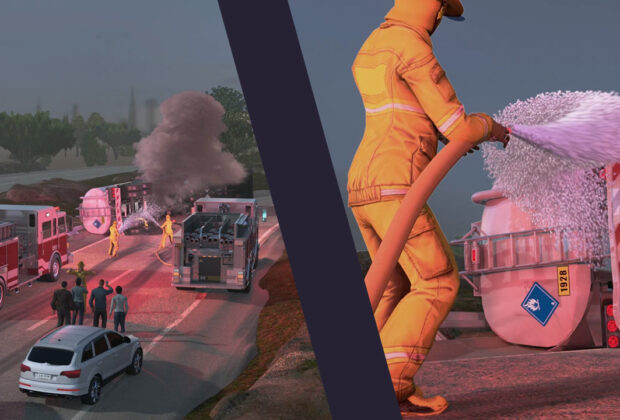Every Canadian employer has a responsibility to protect workers and maintain a safe environment. Investing in workplace health and safety training is not just a legal requirement. It also lowers risks and builds a strong safety culture. This shows that you are compliant, invest in your workforce to increase employee retention, and demonstrate care in ensuring your most important assets, your people, get home safe.
According to the Government of Canada’s 2022 report on occupational injuries, there were 67 workplace fatalities and over 18,000 disabling injuries in a single year. Many of these incidents could have been prevented with proper training and compliance planning.
As 2025 begins, here’s a practical compliance checklist to ensure your team has the right training in place.
2025 Employer Safety Training Checklist
Hazardous Materials & Chemical Safety
Workers who handle or are exposed to hazardous products must complete training under WHMIS, and with the deadline to transition compliance to the 7th edition of the Hazardous Products Regulations update nearing on December 14, 2025, this is an opportune time to prepare your workers for the updates.
If your workforce is expected to handle, offer for transport or transport dangerous goods, they also require their Transportation of Dangerous Goods (TDG) certification. Employers are also responsible for keeping training records and ensuring certifications are renewed.
- WHMIS (GHS) Online Certification
- WHMIS 2-Day Train the Trainer
- TDG Online Training
- TDG Online Training & WHMIS (GHS) Online Training Bundle
- TDG Road and Rail Online Training
- TDG Competency-Based Training: Specialist
- TDG Competency-Based Training: Carrier
- TDG Competency-Based Training: Shipper
- TDG Competency-Based Training: Receiver
- TDG Competency-Based Train the Trainer
- TDG Class 7 for Portable Gauge Users and Wireless Online Training
- TDG Class 7 for Radiographers Online Training
- TDG Lithium Batteries Ground Online Training
Joint Health & Safety Committee (JHSC)
Every workplace in Canada with 20 or more workers requires a JHSC, and JHSC members need training to fulfill their duties and responsibilities. The requirements for JHSC training will differ based on your location.
In Ontario specifically, workplaces must have at least two certified JHSC members with CPO-approved certification. Certification requires completion of both Part 1 and Part 2, plus refresher training every three years. These programs help committees fulfill their duty to inspect workplaces, investigate incidents, and recommend improvements.
Mandated JHSC Training for Ontario Workplaces:
- JHSC Part 1 Online Training
- JHSC Part 1 Instructor-Led Training
- JHSC Part 2 Instructor-Led Training
- JHSC Refresher Instructor-Led Training
Recommended JHSC Training for other Provinces:
- Joint Health & Safety Committees and Representatives Online Awareness Training
- Workplace Inspections and Incident Investigations Online Training
Respectful & Compliant Workplace Conduct
Bill C-65 of the Canada Labour Code makes workplace violence and harassment training a mandatory requirement for federally regulated employers. Harassment and violence prevention training is also mandatory in most provinces. Employers must provide employees with awareness and procedures to address inappropriate behaviour, substance use, and other risks to a respectful workplace. Additionally, employers and employees both need to understand their responsibilities in regards to alcohol and cannabis policies.
We have a thorough suite of training to strengthen your workplace’s culture, inclusiveness, and safety.
- Respect and Inclusion in the Workplace
- Unconscious Bias
- Violence & Harassment Prevention in the Workplace
- Cannabis Workplace Safety for Employees
- Cannabis Workplace Safety for Employers
- Employee Drug & Alcohol Awareness
- Supervisor Drug & Alcohol Awareness Training (Non-DOT)
- Supervisor Drug & Alcohol Awareness Training (DOT)
The benefits of these programs go beyond compliance. Training protects your people, your culture, and your bottom line.
PPE & Equipment Safety
Legislation requires employers to provide personal protective equipment (PPE) and ensure employees know how to use it properly. Training is also essential for ladders, scaffolds, and other workplace equipment.
- Hazard Awareness Online Training
- Ladder & Scaffold Certification
- Ladder Certification
- PPE Awareness
- Preventing Injuries – Avoiding Sprains and Strains
Driver & Transportation Safety
Employers with workers who drive as part of their job must provide defensive driving training. This reduces collisions, improves driver confidence, and supports compliance with occupational health and safety obligations.
Through our partnership with Fleet Safety International (FSI), Danatec’s courses teach the SAFER System—Space, Attitude, Foresight, Eyesight, and Responsibility—a proven framework that helps drivers anticipate hazards, maintain safe distances, and take accountability on the road.
Class 5 training (Class G in Ontario) covers defensive driving, winter driving, and trailer safety for standard vehicle operators. This driver training helps new and experienced drivers. Class 1-4 training (Class A-D in Ontario) equips commercial drivers with skills in areas like inspections, cargo securement, hours of service compliance, and professional driving behaviour. This driver training helps transportation professionals, fleet operators, and bus drivers.
- Canadian Heavy Truck Weight and Dimensions Online Training
- Defensive Driving Online Training – Condensed (Canada)
- Fatigue Management for Supervisors and Drivers
- Mentally Active Driving Program (Blended)
- North American Cargo Securement Program (Core Program)
- Professional Driver Improvement Course (PDIC) – Condensed
Working at Heights
Falls are consistently one of the top causes of workplace injuries in Canada. Any employee working above ground level must have accredited fall protection training.
- Fall Protection
- Fall Protection – Alberta
- Fall Protection – British Columbia
- Mobile Elevating Work Platform Certification
Outdoors & Remote Work Awareness
For crews working outside or in remote locations, environmental training protects workers from unique risks such as wildlife or tick-borne illnesses.
Why an Annual Compliance Review Matters
Training is not a one-and-done exercise. Certifications expire, regulations change, and workplace risks evolve. Conducting an annual training review ensures your workforce stays compliant and ready for the year ahead.
Benefits of an annual review include:
- Meeting OH&S compliance requirements.
- Refreshing employee knowledge and building confidence.
- Reinforcing a workplace safety culture where everyone plays a role.
- Building a safer workplace and improve your team’s operations
Protect Your Team with Danatec
Danatec has been Canada’s trusted safety training partner for 40 years. Our workplace health and safety training catalogue includes WHMIS, fall protection, JHSC certification, violence and harassment prevention, and PPE awareness.
With instant digital certification, flexible delivery (online, blended, and instructor-led), and bulk pricing for employers, Danatec makes compliance simple and effective.
Please reach out to our team with any questions—we’re here to provide the expert support you need.




Comments are closed.